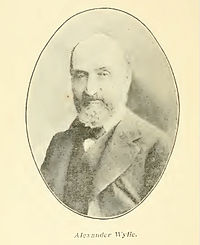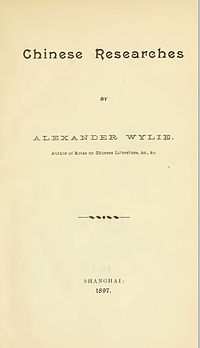Alexander Wylie
Alexander Wylie (born April 6, 1815 in London , † February 6, 1887 in Hampstead ) was a British missionary and mathematician.
biography
Wylie taught himself Latin and Chinese when he was apprenticed to a carpenter. He learned the language so well that the London Missionary Society sent him to Shanghai in 1847 to oversee their publishing house there. There he learned other languages and became interested in the history of Chinese mathematics . At the same time he was responsible for the distribution of over one million Chinese editions of the New Testament on behalf of the British and Foreign Bible Society , of which he was the official agent from 1863. In 1877 he went back to London.
In 1852 he published articles in the North China Herald on Chinese mathematics ( Jottings on the Science of the Chinese Arithmetic ). They also became known in Germany and KL Biernatzki and Ludwig Matthiessen published about them in Crelles Journal ( Journal for pure and applied mathematics ). The essays report for the first time the Chinese origin of the method later known as the Chinese remainder of the sentence and the Chinese origin of the Horner scheme (introduced in the West by William George Horner in 1819). The essays by Wylie (and an essay by Édouard Biot in the Journal asiatique from 1839) were the only source of Chinese mathematics on which Moritz Cantor relied in his extensive history of mathematics.
At the same time he translated mathematics, mechanics and astronomy books into Chinese, working with the mathematician Li Shanlan (who is considered to be the outstanding Chinese mathematician of the 19th century). He also translated the Gospels of Matthew and Mark into Chinese.
In 1858 he accompanied Lord Elgin on a British Navy gunboat up the Yangtze River to Nanjing , where he was part of a delegation negotiating with the Taiping rebels . In 1868 he accompanied the missionary Griffith John (1831-1912) of the London Missionary Society , who translated the Bible into Chinese, to Sichuan .
Wylie sold his extensive Chinese book collection (20,000 volumes) to Oxford University in 1882 , where it is now in the Bodleian Library (Alexander Wylie Collection).
Fonts
- Translation of the Ts'ing wan k'e mung [清 文 啟蒙 Qingwen jimeng], a Chinese Grammar of the Manchu Tartar Language; with introductory notes on Manchu Literature. (Shanghai: London Mission Press 1855) Digitized
- Memorials of Protestant Missionaries. Shanghai 1867 online
- Notes on Chinese Literature. Shanghai 1867 digitized ; New ed. 1902 digitized
- Jottings on the Science of the Chinese Arithmetic. Shanghai Almanac 1853 (first in North China Herald in 1852 ) (see also Chinese Researches digitalisat )
- Chinese Researches. Shanghai 1897 (with a Biographical Sketch of Alexander Wylie of Rev. James Thomas) Digitalisat
References and footnotes
- ↑ Life data according to Dauben & Scriba. According to the 1911 Encyclopædia Britannica , he died on February 10th.
- ↑ Biernatzki: About the arithmetic of the Chinese. In: Crelle Journal. Volume 52, 1856, pp. 59-94 online . Translated into French by Joseph Bertrand in the Journal des savants 1869.
- ↑ Matthiesen: About the so-called residual problem in the Chinese works Swan-king by Sun-tsze and Tayen lei schu by Yih-hung. In: Crelle Journal. Volume 91, 1881, pp. 254-261, online . This refers to the Sunzi suanjing by Sun Zi from the 3rd century (and his commentator Qin Jiushao from the 13th century) and the 8th century Buddhist priest Yixing (see also Dayan li 大 衍 曆 ). The remainder of the sentence can also be found in the Disquisitiones Arithmeticae by Carl Friedrich Gauß .
- ^ Martzloff, Jean-Claude: A History of Chinese Mathematics. Jumper
literature
- Dauben, Joseph W. , Scriba, Christoph J. (Editor): Writing the History of Mathematics. Birkhäuser 2000
- Henri Cordier : The life and labor of Alexander Wylie. London 1887
Web links
| personal data | |
|---|---|
| SURNAME | Wylie, Alexander |
| BRIEF DESCRIPTION | British mathematician |
| DATE OF BIRTH | April 6, 1815 |
| PLACE OF BIRTH | London |
| DATE OF DEATH | February 6, 1887 |
| Place of death | Hampstead |


